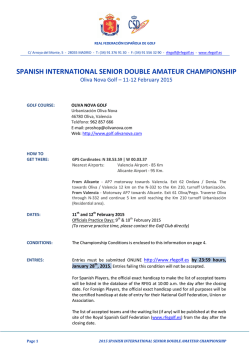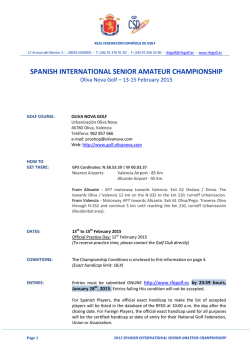
February 2015 - Montana State Golf Association
PO Box 4306, Helena MT 59604-4306 (406) 458-3359 New MSGA Board President Appointed Nick Dietzen, MSGA Communications Director As the calendar has turned and temperatures have fluctuated, teasing us with the idea that golf season may not be so far away, a familiar face for those acquainted with the MSGA has begun his service as MSGA Board President – Steve Sherburne. Sherburne, who owns an insurance company in East Glacier, is patient and unassuming, but energetic with convictions, and has a passion for the game of golf. He found himself serving as a volunteer in the MSGA in an interesting way. “I grew up a block from East Glacier Lodge Golf Course. I started playing when I was five. I kept at it and eventually I started taking care of the early handicaps for our golf league in the late 80’s,” Sherburne said. Of course, this was well before entering handicaps on computers and the idea of putting any information into a mobile phone would have been absurd. Handicaps were done on paper. The MSGA sent out postcards and Sherburne was the contact for EGGC. “They extended an invitation for any representatives to attend their meetings. I ended up going and I was the lone representative from a course. The next year I went again and I was the only person again,” Sherburne recounted. The MSGA quit sending out cards shortly afterwards with the poor attendance, but that didn’t stop Sherburne from making the annual trek from East Glacier. At the annual meetings, Sherburne met a host of devoted folks including Gene McGlenn, a board member in charge of a ratings team. “Gene invited me to become part of the team and I enthusiastically accepted. That particular year [1992] they had a USGA Ratings Course in Helena. I got right to work after attending that,” Sherburne. Through Sherburne’s devotion to course rating and his regular attendance, a spot opened up in the mid-90’s on the board and, as Sherburne jests, “I was hanging around and they decided they needed to appoint me since I was coming every year anyway.” As a member of the board, Sherburne continued to meet, as he deems, “the founding fathers of our most recent board”, ....Continued on the next page February 2015 - Volume 5, Issue 2 MSGA Funds Donated Nick Dietzen In addition to funding junior golf, the MSGA annually allocates resources to help Montana schools and their golf programs. “It’s the MSGA’s hope that we can continue to grow junior golf around the state and, in turn, opportunities to play collegiately will increase both in Montana and beyond,” MSGA Executive Director Jim Opitz said. For over twenty years, the MSGA has supported both the University of Montana and Montana State University women’s golf programs. This year, each institution will receive $5,000. "This is a generous donation by the MSGA. We appreciate its support of our program," said second-year University of Montana coach Joni Stephens. "Donations like this allow us to supply and update equipment and facilities for our program, which enables us to continue to move our program to a higher level." This year's gift by the MSGA will be put toward the construction of the team's new indoor practice facility at the Ranch Club. The heated range building, which may be usable later in the spring, before officially opening in the fall, will feature four hitting bays, putting and chipping greens and lockers for the players. PRESIDENT... from previous page increased interest in volunteerism will come with time. “I was really fortunate to be there in those early meetings. I met so many fantastic folks... people like John Frankino, who was dynamic and helped me learn in many areas,” Sherburne said. With his growing experience, Sherburne began to see some changes within the leadership and an emphasis on combating the challenges of golf within the economic downturn. Sherburne could be described with respect to course rating as a junkie. He describes the process as “more fun than we should be allowed to have without breaking the law.” An effusiveness comes through when Sherburne speaks of, not only the process, but the transcendent opportunity that course rating provides. “It allows us to really look at every course, to spend time looking, not playing. Really the joy is to look at it from a different perspective than you would as a player,” Sherburne said. and continued to learn about the past traditions as well as grow in his knowledge of the future aims of the MSGA. The MSGA’s most recent president, Mike O’Neill of Butte, brought a strategic vision and energized the board that had not always met multiple times per year. With an emphasis on growth and exploring change, O’Neill gained momentum with an evolving board. “It’s no small job to work with people who have different ideas and perspectives. Mike really got the ball rolling for us,” Sherburne emphasized. “He got us thinking in terms of what we can do with this organization, to not only help it survive, but thrive. He understood that we were at a time in which it was critical to examine our organization and build on our strengths and improve our weaknesses.” O’Neill supported board president limits and, while not stepping away from his volunteer efforts within the MSGA, is turning the reigns over to Sherburne. “I couldn’t be happier to be working with this group. They are a lot of fun; they will have to contend with my quirkiness, but I think we are on our way to some exciting changes in the future,” Sherburne said. Course raters spend time staring at golf holes, trying to figure out the various scenarios that each category of skill level may encounter; seeing the course from the eyes of all golfers, the long hitters, the erratic ones, those with differing ball flights and propensities to play the left side or the right side of the course. Sherburne particularly enjoys visiting remote locations around the state and visiting with people in those places at the courses and everywhere in between over the thousands of miles he spends every year on the ratings trail. “Montana is a great place when you start to explore. The people you meet are so helpful, they are friendly and fabulous all over our great state,” Sherburne said with pride. The ratings guru estimates he has seen about 70-percent of the courses in the state, but hopes to have every one checked off. With ratings teams covering different areas, he says he will have to make some special trips from his tucked-away hometown of East Glacier. Sherburne’s story of how he came to offer his time and interest in the game of golf is a unique one, rooted in an interest and steadfast commitment to serving his golf club. How he happened upon the game? His father Fred was a golfer, and a fan of greats like Ben Hogan and Cary Middlecoff. When the PGA Tour rolled through Seattle, Fred took Steve and his brothers on a trip to watch the tournament and that very trip was Sherburne’s indoctrination to golf. While the MSGA was born from the expressed purpose of conducting a state amateur golf tournament, its duties and responsibilities have grown with the parallel growth experienced with golf. More recently, with a worldwide decline in the game, organizations have been faced with numerous challenges. Sherburne feels that many of the initiatives set forth from previous committee meetings will affect positive change. An overarching goal for golfers in the state is to understand not only what the MSGA does, but that by obtaining a handicap, they are an MSGA member – a fact not always well-known by Treasure State Golfers. “My grandfather came out to East Glacier about 120 years ago to Fort Browning as a licensed trader. My family has been here ever since. We pretty much have stayed put,” Sherburne comments. Like many who have found great enjoyment in not only playing golf, but also contributing talents around the game, Sherburne hopes that not only increased awareness, but His odometer tells another story…Steve Sherburne has done anything but stay put. Ready For Fun? Support Junior Golf! Watch the MSGA Website for the 2015 MSGA vTour Series event dates, and make sure to register you and your family. Proceeds from MSGA Specialty Plates are used to help support Junior Golf Programs and Tournaments in Montana. -2- Have You Tried The GAME TRACKER Yet? Emily Hulsey, MSGA Handicap and Website Coordinator What’s a Game Tracker and how do you access it? First, enter your score at the Course Kiosk, Online, or with the MSGA Smartphone App. Important: You’ll need to enter the HOLE-BY-HOLE information (not the Gross Score) in order to track the stats. Next, log in to your account online (www.msgagolf.org). Click the green “Game Tracker” button. There are several categories listed on the left column: Game Stats (includes summary, scoring, greens in regulation, driving accuracy, putting, recovery, par performance) and Statistical Records (includes top scores, eagles, birdies, pars, bogeys, doubles, GIR, FIR, and fewest putts). There are also GRAPHS to show your progress. It’s a great way to gauge your performance, to nudge yourself where you’re lacking, and pat yourself on the back where YOU ROCK! Get yourself set up and try it this season! You can contact Emily at [email protected] if you need help or have questions. “A Difficult Par” Wins USGA Book Award Scholarship Deadline 3/15 In recognition of its high standard of achievement in golf literature, James R. Hansen’s A Difficult Par: Robert Trent Jones Sr. and the Making of Modern Golf has earned the USGA’s Herbert Warren Wind Book Award for 2014. The MSWGA Scholarship deadline for 2015 is fast approaching. The scholarships are for graduating high school senior girls involved in golf. Hansen’s profile of renowned golf course architect Robert Trent Jones Sr. is an expertly researched and written reflection on the life and career of one of the most prolific, well-respected, and transformational figures in the history of golf. “Robert Trent Jones was a colossus of the game and his contributions to golf course architecture undoubtedly influenced the way championship golf has been played over the past 65 years,” said Michael Trostel, senior historian for the USGA Museum. “In A Difficult Par, James Hansen uses exhaustive research methods to deliver a comprehensive depiction of the man who shaped the landscape of modern golf, skillfully weaving together the story of family and business to break new ground on one of the game’s most cel- ebrated and significant designers.” “To have the USGA and Herbert Warren Wind associated with a book that I wrote is a huge honor,” said Hansen. “There is no name in golf writing more respected or more prestigious than Wind. As a writer, it is the ultimate distinction in my career.” With the help and cooperation of Jones’ sons, Robert Jr. and Rees, who shared letters, documents, and personal stories of their father, Hansen pieced together the life events and struggles that the Britishborn Jones encountered on the way to creating his legacy. A gifted and passionate golfer, Jones served as the first golf professional at Sodus Bay Heights Golf Club in Sodus Point, N.Y. During his tenure, he caught the eye of club president James D. Bashford, who sponsored Jones and encouraged him to enroll in Cornell University’s architecture program. At Cornell, Jones tailored his curriculum in landscape architecture and agronomy to create a degree in ....Continued on the next page -3- The application can be found online at msgagolf.org, under the MSWGA tab. This will be the 25th year that scholarships have been awarded. In 1990, the MSWGA awarded its first scholarship to a graduating senior. Many years multiple recipients have received a Scholarship. This involvement may include past or present participation on a high school team or in a junior program. The scholarship isn’t based on golf skill, but rather on participation as an amateur player, and involvement and leadership in school, community, and church activities. The quality and talent of the young ladies in this state is very evident and the MSWGA feels they should therefore be recognized and rewarded. All scholarship applications must be received by March 15th. BOOK AWARD... from prev. page golf course design and management. Upon graduation, Jones struggled to find work in a U.S. economy that was mired in the Great Depression. His patience, timing, and relentless pursuit of his dreams eventually paid off, as he passionately and successfully promoted the construction of new golf courses… a wise use of public money and labor that had become available under President Franklin Delano Roosevelt’s Works Progress Administration (WPA), part of the New Deal initiative. A Difficult Par focuses not only on Jones’ achievements in design and architecture, but also on the personal and financial challenges that he faced throughout his career. Hansen carefully details the family dynamics and professional rivalries that occurred during the latter part of his career. “Of all the architects, I think Robert Trent Jones was the most significant in the development of American golf courses,” said Hansen. “It wasn’t just the longevity of his career, but also how his courses came to be the dominant venues for championship golf.” Jones designed or redesigned nearly 450 courses in 42 states and 28 countries, including 11 courses that have hosted a combined 34 U.S. Opens. His design philosophy of challenging the best golfers, while making the game enjoyable for players of all abilities, became essential in making the game attractive to casual players and made him an archetype for future designers. The Herbert Warren Wind Book Award will be presented to Hansen on Feb. 7 at the USGA’s Annual Meeting in New York City. Do you want something in the newsletter? Post Scores at HOME. View Score History. TRACK Stats. Print Your Card. Message FRIENDS. MSGA Smartphone APP “MSGAGOLF” USGA 2015 CHAMPIONSHIP SCHEDULE ANNOUNCED The championship season fittingly begins with two new championships. The U.S. Amateur Four-Ball and U.S. Women’s Amateur Four-Ball will consist of 128 and 64 two-player teams, respectively, with each competitor playing their own ball throughout the round. Each team’s score will be determined by using the lower score of the partners for each hole. After 36 holes of stroke-play qualifying, each field will be reduced to the low 32 teams for the championship’s match-play bracket, from which the eventual men’s and women’s champions will be determined. On June 18-21, Chambers Bay, in University Place, WA, will host the 115th U.S. Open Championship, the first contested in the Pacific Northwest. The third municipal course to host the championship, the links-style course is part of a 930-acre park and lies on a former gravel and sand quarry. “A committed group of clubs and communities will conduct our 2015 championships,” said Daniel B. Burton, USGA Vice President and Chairman of the Championship Committee. “The USGA’s national championships will be held in 12 states and experienced by golf fans in many regions of the country. We are also thrilled to bring the U.S. Open to the state of Washington and introduce four-ball on the national level as part of our ongoing commitment to support and advance amateur competition.” 2015 Championship Schedule: U.S. Amateur Four-Ball Championship, The Olympic Club, San Francisco, CA, May 2-6 U.S. Women’s Amateur Four-Ball Championship, Bandon Dunes Resort, OR, May 9-13 U.S. Open, Chambers Bay, University Place, WA, June 18-21 U.S. Senior Open, Del Paso Country Club, Sacramento, CA, June 25-28 U.S. Women’s Open, Lancaster Country Club, PA, July 9-12 U.S. Girls’ Junior, Tulsa Country Club, OK, July 20-25 U.S. Junior Amateur, Colleton River Plantation Club, Bluffton, SC, July 20-25 U.S. Women’s Amateur, Portland Golf Club, OR, Aug. 10-16 U.S. Amateur, Olympia Fields Country Club, IL, Aug. 17-23 USGA Women’s State Team, Dalhousie Golf Club, MO, Sept. 10-12 Walker Cup Match, Royal Lytham & St. Annes GC, Lancashire, England, Sept. 12-13 U.S. Senior Women’s Amateur, Hillwood Country Club, Nashville, TN, Sept. 26-Oct. 1 U.S. Senior Amateur, Hidden Creek GC, Egg Harbor Township, NJ, Sept. 26-Oct. 1 U.S. Women’s Mid-Amateur, Squire Creek Country Club, Choudrant, LA, Oct. 3-8 U.S. Mid-Amateur, John’s Island Club, Vero Beach, FL, Oct. 3-8 Contact Nick Dietzen at: [email protected] (406) 459-3459 -4-
© Copyright 2026





